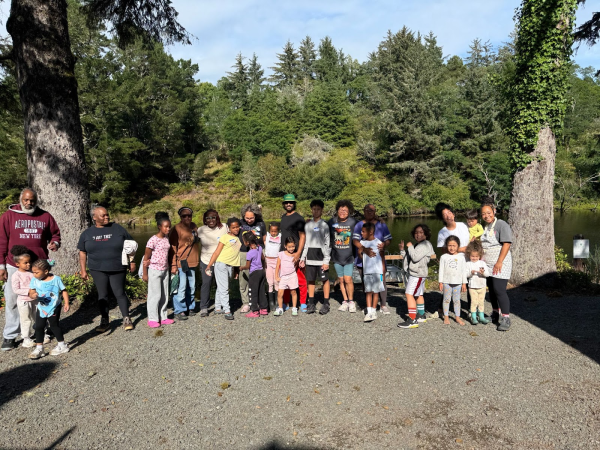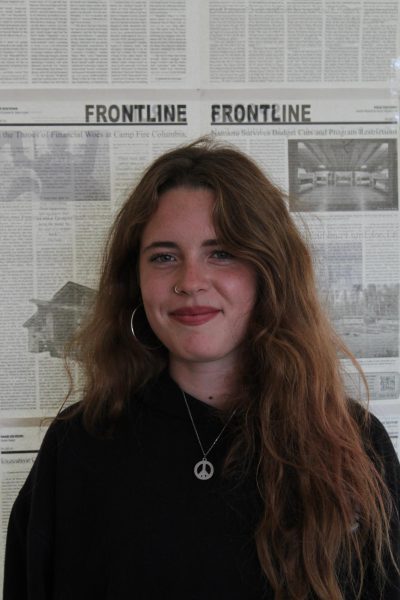
“It’s been [a] healing [experience] for people to be able to go out and enjoy the beauty that Oregon has to offer and feel safe,” says Pamela Slaughter, founder of the nonprofit organization People of Color Outdoors (POCO). The organization, which currently has over 7,500 members, strives to establish equity in outdoor spaces by cultivating an environment where people of all races and cultures feel welcome to participate in nature-based activities and programs.
Slaughter’s mother was an integral inspiration for her love of the outdoors throughout her childhood. Her mother was adamant about the importance of appreciating nature, taking Slaughter and her siblings on weekly excursions and adventures. In turn, Slaughter sought to foster the same love of nature in her children. Unfortunately, she and her daughter encountered many negative experiences while outdoors. Once, while hiking, Slaughter says they were followed off a trail by a group she describes as “skinheads,” a term associated with people who promote white supremacy and neo-Nazism. The unsafe feeling was a traumatic experience for her and her young daughter, and it exemplified the trend of fear that many people of color have felt due to a history of racial violence in the Pacific Northwest’s outdoor areas. It was unsettling to Slaughter that this fear of harassment might prevent children of color from experiencing the outdoors in the ways she had, so she sought to establish a presence of people of color in Oregon parks. Slaughter began by reaching out to Rue Mapp, the founder of Outdoor Afro, a national nonprofit organization that inspires Black connection and leadership in nature. She started a Portland chapter of Outdoor Afro in 2015 and was approached by people who were seeking a group that welcomed all races.
In 2017, Slaughter started POCO, using her weekends to prioritize advertising through Facebook while still working as a realtor. During community events, she was approached by people who encouraged her to turn the group into a nonprofit. In 2022, she quit her full-time job to run POCO as a professional nonprofit organization, and in that same year, she won the Joey Pope award, which is awarded to emerging leaders of parks and other specific projects investing in nature.
POCO has hosted over 400 events since 2017, including hikes, camping trips, bird watching, paddleboarding, educational workshops, and overnight stays at Camp Westwind in Otis, Oregon. The People of Color Outdoors Guardians is housed in Columbia Cottage at Columbia Park and invites students in kindergarten through fifth grade to become “guardians,” who are active participants in their own and others’ outdoor education. It provides them with a community outside of school and their homes and encourages climate activism from a young age. It is offered during the summer, winter, and spring breaks.
Inspired by the Zoo Apprenticeship Program offered by the Oregon Zoo, which is a multi-year apprenticeship program primarily serving youth of color and youth from low-income families, Slaughter began providing internship opportunities for youth. Israel, one of her first guardian students, became her first teen intern. Interns are in middle school and high school, and they study a topic in nature and teach a 30-minute class to the guardians.
To encourage strong connections, POCO hosts additional community events with optional hiking where people can gather, play games, share a meal, and get to know each other. Portland has a relatively homogeneous racial demographic; the 2023 United States Census Bureau’s American Community Survey reports that around 67% of people identify as non-Hispanic white. This makes it difficult for people of color to seek relationships with other people of the same race. Slaughter explains how the community events help address this dilemma, saying “It’s partly to help us to connect on a human level, in addition to helping us to connect culturally with people that look like us.”
State and national parks have historically been areas of violence and racism. From the 1860s to the 1960s, the majority of lynchings of Black people occured in outdoor spaces and forests. The Oregon constitution, written in 1859, segregated outdoor land, or barred Black communities from entrance altogether. While the 1964 Civil Rights Act and other laws dismantling segregation made it legal for Black communities to reenter these spaces, the perceived threat of violence often remained.
Another driving influence is the intentional erasure and whitewashing of history and land ownership, especially of Indigenous names, land, and findings. Many national parks in the country have names tied to racism and colonialism, which can create an atmosphere of white ownership and inaccessibility, causing people of color to feel unwelcome.
These barriers continue to prevent people of color from experiencing the outdoors. In the time POCO has explored Oregon trails and natural areas, there have been various reactions to their presence. While the experiences have mostly been positive, Slaughter shared that “once [they] were at a Metro Park, and someone stepped off the path, turned their back, covered their eyes, and said, ‘I don’t want to see them there. I don’t want to see them here.’” Slaughter is one of many to report harassment in natural areas, and has put in continual effort to actively influence a change in the culture.
To combat Oregon’s history of exclusion in outdoor recreation, voters in 2013 approved a Parks and Natural Areas Levy to create opportunities for nature closer to home. This included “funding for a Parks and Nature Community Partnerships program that supports communities of color in building capacity and connecting people with nature,” reads the 2024 Metro community grants handbook.
A variety of grants support POCO, largely from companies sponsoring activities or use of their parks such as the Oregon Community Foundation and Metro, a regional government including multiple counties within Portland. One grant helps them lead walks that encourage health and wellness. Another provides funding for visits to parks and nature preserves designated in the Portland Metro area, while one is reserved solely for trips to Oxbow Park. Through this funding, POCO has grown in its ability to expand its outreach and offer resources to the community.
Hannah Erickson, the senior communications specialist at Metro, explains that the mission of Metro’s parks and nature grant program is to help people in the region connect with the nature around them. “In all cases, the goal is to ensure that everyone has access to our services and locations and can connect with nature in meaningful ways,” she says.
The growing influence of community focused groups like POCO allows for Oregon’s history of racial discrimination and current stigmas in modern spaces to be clearly addressed and combatted.






































